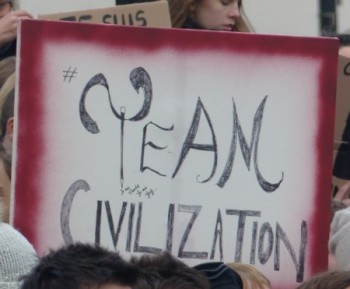We are developing the social individualist meta-context for the future. From the very serious to the extremely frivolous... lets see what is on the mind of the Samizdata people.
Samizdata, derived from Samizdat /n. - a system of clandestine publication of banned literature in the USSR [Russ.,= self-publishing house]
|
Like so much electronic chaff dropped out of the back of a Tupolev bomber to confuse an incoming heat-seeking missile, the idea that there are multiple interpretations of the truth has become the founding philosophy of state disinformation in Putin’s Russia, designed to confuse those who would seek out the truth with multiple expressions of distracting PR chaff. The tactic is to create as many competing narratives as possible. And, amid all the resultant hermeneutic chaos, to quietly slip away undetected. It is a tactic straight out of Mr Putin’s KGB playbook from the 1970s. Generate a plurality of narratives, so the truth can be obscured.
– Guardian editorial. Yes I know, chaff only confuses radar-guided missiles, you need flares for heat-seekers, but hey, this is the Guardian after all. Mangled metaphor aside, this is a very good editorial that will enrage all the right people.
Play the audio in this story and see if you can suppress an involuntary wince of sympathy: Incredibly Awkward Interview With Natalie Bennett. (Ms Bennett – a Samizdata commenter – is currently leader of the Green Party of England and Wales.)
Kudos to Nick Ferrari who can evidently do what so many media folk cannot: order-of-magnitude mental arithmetic.
Life is unfair. If The Boris had been on the hot seat he’d have said, “Oh cripes, you’ve ker-splonked me there!” and everyone would have loved him all the more.
Just three months into Ukip’s shock victory as the party of government and already Nigel Farage’s mob are starting to show their true colours: morris dancing has been made compulsory for every able-bodied male between the age of 30 and 85; in ruthlessly enforced union flag street parties, brown-skinned people are made to show their loyalty by eating red-, white- and blue-coloured Battenberg cakes until they explode. And what is that acrid smell of burnt fur now polluting Britain’s hitherto gloriously carbon-free air? Why it is all the kittens that Nigel Farage and his evil henchmen are tossing on to beacons from John O’Groats to Land’s End in order to demonstrate that Ukip are the masters now.
– James Delingpole. You don’t have to be a UKIP fan (I am not) to be unimpressed by the tendentious nature of the Channel Four spoof documentary that Delingpole writes about here. Meanwhile, JD imagines what a spoof on the Greens would be like. In reality, the chances of Channel Four, a fairly leftist news channel, doing some sort of job on the Green Party is remote, but it should, given the fluorescent idiocy, authoritarianism and often just sheer ugliness of what that outfit wants to do in practice. See its latest manifesto.
You are probably all aware of the attack in Denmark earlier today by certain advocates of the religion of peace. But this is inspiring stuff:
Danish broadcaster DR: The freedom of speech meeting continued after shooting to send a strong signal to attackers
They had my respect regardless for simply holding the meeting in the first place, but doubly so now.
Crash OverRide Network is not an anti-harassment campaign. It cannot be an anti-harassment campaign as it is run by someone who profits and gains notoriety by openly harassing people online. An anti harassment campaign is one that works to prevent the harassment of everyone, whether you personally like them, whether you disagree with things they have done, or whether they share your political ideals. If Quinn really wished to prevent harassment online, she would stop perpetrating it. I will surely not be the last woman she tries to remove from our industry.
– Georgina Young
Of course the BBC, pretty much the worst tech reporters to be found anywhere, fail their due diligence as usual and just report it all at face value.
I understand why NickM, for instance, complains about all the people waving Je Suis Charlie signs at the recent Charlie Hebdo demos just over a week ago. But at least there were demos (Hebdemos?), and big ones. Whatever the finer points of the relationship between Islam and the rest of us, thousands upon thousands of people, in France millions, disapproved of cartoonists being killed, no matter how offensive anyone might think they had been, just because of various cartoons they had done. I agree that disapproval is not much. Ooh, they disapprove. But it’s a start. I mean, would you rather that all those millions of demonstrators had just shrugged their shoulders, stayed indoors and forgotten all about it?
And yes, there was plenty of hypocrisy involved, on the part of public personages who, only weeks or days before the attacks, had been saying more like: “Je Ne Suis Pas Charlie”, and who will be saying much the same as that in a few days or weeks time. But I prefer hypocrisy and inconsistency to brazen wickedness. If you demand consistency from public figures, you are liable to get consistent stupidity and consistent wickedness. The public attitudes that public people feel they need to strike, even if they strike them very insincerely or in a way that contradicts other things they have earlier said and done and will later say and do, still count for something.
I attended the demo in London’s Trafalgar Square, and I made a point of photoing signs that said other things besides Je Suis Charlie, of which this was my favourite:

For the benefit of those with no French, that means (unless my French is letting me down badly) something along the lines of: “Down With The Tyranny of The Offended”. Good one. See also the earlier posting here, in which our Prime Minister is reported as standing up for the same idea. And, see my paragraph above (which I had already written before that earlier posting had appeared) about how the public attitudes of public people do matter, however occasionally and inconsistently they may be expressed.
This next sign might have been my favourite. But, that T for Team looks too twiddly, and not clear enough and assertive enough. It’s like the guy who wrote the sign was just taking dictation and didn’t really mean it.

Or, it could just mean that here were some people demonstrating who had not done any such thing before. Because, this was not your usual demo, the sort of demo perpetrated by the demonstrating classes, so to speak. Which was another big plus, from where I was standing, photographing everything I could see.
You can view other photos that I took of signs that afternoon here.
I just read a comment, written by someone calling himself “Jonny Overcat”, which (a) tells me that the art of invective is not dead, and which (b), I think, deserves wider circulation. At the time of me concocting this posting, it is comment number six on this take-down of the appalling Mehdi Hassan. Here it is in full:
I can hardly put into words how viscerally disgusted I’ve felt the past couple of days with a significant number of allegedly “progressive” writers in American media who just trip all over themselves to denounce Charlie Hebdo as racist, wrong, oppressors and likely people who fuck puppies for fun. The forceful ignorance, the utter lack of even the most basic research or familiarity with the publication and people they are crassly denouncing, and the apologism (is that even a word? Now it is I guess) for the murderers are just utterly subhuman. A big part of it is that I’ve lived in Paris, I have family in Paris and I’ve pounded the pavement in every arrondissement pretty extensively (I do a lot of street photography). I absolutely love that city and its people, and any sort of terrorist attack there is deeply upsetting to me. I’m quite familiar with the neighborhood where Charlie Hebdo’s offices are, I have friends I used to visit who lived just a couple of blocks away from there. I take a terrorist attack in Paris kind of personally, even though I realize that it’s not all about me. I’ve been there during terrorist events in Europe (the Madrid train bombing) and I’ve seen the squads of soldiers patrolling the streets due to that, and the fear on people’s faces in the Metro etc.
So over on Slate, there’s the walking abortion that is Jordan Weissmann, who, before the puddles of blood of the murdered were even dry, valiantly asserts that Charlie Hebdo is just some racist rag and does everything short of just coming right out and saying that they had it coming to them. Never mind, of course, that he quite clearly demonstrates with his mischaracterizations, outright falsehoods and quite obvious lack of actual knowledge about the publication or its staff, that he just hasn’t got a fucking clue. An opportunist piece of shit trying to burnish his PC cred by symbolically standing over the corpses of the murdered and screaming “RACISTS!”
Then over at Salon there’s a specimen called Falguni A. Sheth, who ideally should’ve been fed into a wood chipper as an infant, whose article asserts that the REAL issue is Muslim feelings and how utterly horrifically Muslims are treated by everyone and boo fucking hoo because the world doesn’t bow low enough to Islam. Of course she asserts that the murderers who invoked Islam as their motivation before and during the attacks weren’t motivated by Islam at all, because whitey is racist. Yep. She hilariously states that Charlie Hebdo, a paper that has been published weekly for about 35 years, which amounts to roughly 1800 or so editions, “disproportionately targets Muslims” because they’ve published about 10 or 12 images satirizing radical Islam in the past ten or so years. Thus they are just some Muslim bashing rag, and basically had it coming. Don’t say what we don’t want you to say or we’ll kill you, and it’s your own fault. Never mind, of course that ten or twelve editions satirizing radical Islam don’t even amount to one percent of Charlie Hebdo’s total published works. Yeah, “disproportionate”, but she can barely bring herself to denounce the killers in anything but a passing fashion, as though their murdering is some minor technicality to be glossed over, because the REAL issue is that some fucking Muslim somewhere has had their religious sensibilities sullied by these evil, evil cartoonists. Because cartoonists do such irreparable harm to society. Muslims, of course, are all saints.
Seriously, fuck these people, all of them, and anyone who agrees with them.
I’ve always been socially and politically liberal, never a lockstep liberal, but always generally liberal. I’ve always had a problem with the significant number of so called American liberals and progressives who are rigidly doctrinaire to the point of stupidity, but over this issue, my disgust is reaching critical mass. I need to seriously consider whether I really have common cause with the unfortunately significant number of so called liberals and progressives who are more enamored of finding common cause with the severely illiberal tenets of Islamic fundamentalist thinking. When Bill Maher called Islam “the motherlode of bad ideas”, he was seriously understating his point. These supposedly liberal pieces of shit who find common cause with Islamic fundamentalism, whose basic grasp of the nature/purpose/context of satire is just as tenuous, or even weaker, than that of their braindead counterparts on the right, are just a bit more than I can stomach anymore.
I just needed to get that off my chest …
For someone who can “hardly put into words” how disgusted he is, Jonny Overcat sure does have a way with words, doesn’t he?
I do love the internet.
The latest edition of Charlie Hebdo has a cartoon of the Prophet Mohammed on the cover. This is when we see who are the men, and who are the boys, so… well done to all the various newspapers who have shown some defiance to those who urged submission, and republished the image.

Dear Electoral Commission,
Thanks, but we’re not registering with you and we’re not going to pay any attention to your rules.
Yours in freedom,
Paul Staines
Editor Guido Fawkes’ Blog
– Guido makes his position clear.
… that he is in the wrong line of work and so are his employees apparently.
The editor of the Independent has said “every instinct” told him to publish the Charlie Hebdo cartoons caricaturing the prophet Muhammad but described it as “too much of a risk”. The newspaper, along with the rest of the UK’s national press, did not reprint any of the satirical magazine’s caricatures of Muhammad or the cartoons from Denmark’s Jyllands-Posten, with which Charlie Hebdo first provoked international outrage in 2006.
Rajan instead put a striking cartoon by Dave Brown on his paper’s front page on Thursday, showing a hand with the middle finger raised emerging from the cover of Charlie Hebdo. But he was “very uncomfortable” with his decision not to reprint Charlie Hebdo’s cartoons, which he described as “self-censorship”.
Rajan said he had a duty to his staff and had to “balance principle with pragmatism”.
Balance? I see ‘pragmatism’, which is to say, abject cowardice in the face of danger brought by republishing cartoons from Charlie Hebdo… but I see no ‘principle’ on display whatsoever, just some waffle designed to distract people from mentioning his ‘pragmatism’ smells a lot like chicken shit.
Je suis Charlie. But if you do not republish, then you are not, so it would be better if you just STFU Rajan.


In the aftermath of the horror yesterday in Paris, I noticed that Mr Obama gave a speech, as many other national leaders did, expressing solidarity with France at this time and supporting free speech. I am sure I am not the only person to note how hollow Mr Obama’s comments sound in the light of how his administration conducted itself around the time of the attack in Benghazi when a film about Islam had been released. This isn’t narrow political point-scoring – Republicans and others are just as capable of getting themselves wrong on this issue. The point, rather, is that Western leaders need to be as ruthlessly consistent as possible. When the Obama administration was tested on this sort of issue, it wobbled. Islamist fanatics notice – it creates incentives among those who calculate that if they create enough hysteria, are sufficiently “offended” by something, that people will cave in. The most powerful country on the planet caved.
Another point worth making, particularly as people across the political spectrum seem to be genuinely shocked and appalled by this attack, is that far too many attacks on free speech these days are justified in the name of banning “hate speech”, and so on. Certain forms of expression may indeed be hateful and unpleasant but the best defence against that is indifference, contempt, or ridicule. And another point, particularly for the more anarchist-minded out there, especially those of a leftist bent, is this: if you want to vent, do so on private property, in a consensual way. The producers of the French magazine did that: no-one was forced to buy their product or forced to read it. It is not as if they sprayed their cartoons in public streets outside a mosque.
Expect more half-hearted bleating that this has nothing to do with Islam, but in any case even if it did, Islam is a religion of peace along with weasel words about “responsibility” to the effect that the magazine should not have “inflamed passions”. Simultaneously, expect a huge PR drive – supported by various lefty idiots – from Muslim groups who make it all about them, how they feel, and how they are now scared of a backlash before the bodies have even cooled. This is precisely what we saw in Australia a few weeks ago, and I don’t expect much from European politicians.
– Tim Newman commenting here.
|
Who Are We? The Samizdata people are a bunch of sinister and heavily armed globalist illuminati who seek to infect the entire world with the values of personal liberty and several property. Amongst our many crimes is a sense of humour and the intermittent use of British spelling.
We are also a varied group made up of social individualists, classical liberals, whigs, libertarians, extropians, futurists, ‘Porcupines’, Karl Popper fetishists, recovering neo-conservatives, crazed Ayn Rand worshipers, over-caffeinated Virginia Postrel devotees, witty Frédéric Bastiat wannabes, cypherpunks, minarchists, kritarchists and wild-eyed anarcho-capitalists from Britain, North America, Australia and Europe.
|








